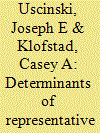| Srl | Item |
| 1 |
ID:
126344


|
|
|
|
|
| Publication |
2013.
|
| Summary/Abstract |
In May 2012, political scientists learned of efforts by representative Jeff Flake (R-AZ) to eliminate political science funding from the National Science Foundation (NSF) budget. The American Political Science Association (APSA) was caught off-guard, and concerned political scientists scrambled to contact their representatives and urge the amendment's defeat. Flake's initial effort to cut funds overall from the NSF was defeated, but a second measure, specifically to keep the NSF from funding political science, passed only hours later. This was the second time in three years that legislators targeted the NSF Political Science Program. Although these measures have been sponsored and widely supported by Republicans, some Democrats have supported these measures as well. This article examines the vote on the Flake Amendment to understand why individual representatives voted for or against cutting NSF funding for political science research.
|
|
|
|
|
|
|
|
|
|
|
|
|
|
|
|
| 2 |
ID:
134799


|
|
|
|
|
| Summary/Abstract |
Journalists consider the importance of events and the audience’s interest in them when deciding on which events to report. Events most likely to be reported are those that are both important and can capture the audience’s interest. In turn, the public is most likely to become aware of important news when some aspect of the story piques their interest. We suggest an efficacious means of drawing public attention to important news stories: dogs. Examining the national news agenda of 10 regional newspapers relative to that of the New York Times, we evaluated the effect of having a dog in a news event on the likelihood that the event is reported in regional newspapers. The “dog effect” is approximately equivalent to the effect of whether a story warrants front- or back-page national news coverage in the New York Times. Thus, we conclude that dogs are an important factor in news decisions.
|
|
|
|
|
|
|
|
|
|
|
|
|
|
|
|
| 3 |
ID:
100788


|
|
|
|
|
| Publication |
2010.
|
| Summary/Abstract |
In October 2009, political scientists learned of a Senate amendment sponsored by Tom Coburn (R-OK) that would eliminate political science funding from the National Science Foundation budget. The American Political Science Association condemned the proposed amendment, and concerned political scientists contacted their senators to urge the amendment's defeat. On November 5, 2009, the amendment was defeated 36-62 after little debate. This article examines the vote on the Coburn Amendment to understand the role that senators' personal, constituency, and institutional characteristics played in their votes. Logit analysis reveals that even after controlling for party, several factors significantly predict the vote, including the number of top-tier political science Ph.D. programs in the senator's state and whether the senator graduated with a bachelor's degree in political science.
|
|
|
|
|
|
|
|
|
|
|
|
|
|
|
|